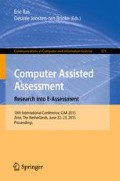Abstract
Nowadays, comparative judgment (CJ) emerged as an alternative method for assessing competences and performances (e.g. Pollitt, 2012). In this method, various assessors compare independently several representations of different students and decide each time which of them demonstrate the best performance of the given competence. This study investigated students’ attitudes (honesty, relevancy and trustworthiness) towards feedback that is based upon this method. Additionally, it studied the importance of specific tips in CJ-based feedback.
Access this chapter
Tax calculation will be finalised at checkout
Purchases are for personal use only
References
Anseel, F., Lievens, F.: The mediating role of feedback acceptance in the relationship between feedback and attitudinal and performance outcomes. Int. J. Sel. Assess. 17(4), 362–376 (2009). doi:10.1111/j.1468-2389.2009.00479.x
Bejar, I.I.: Rater cognition: implications for validity. Educ. Meas. Issues Pract. 31(3), 2–9 (2012). doi:10.1111/j.1745-3992.2012.00238.x
Bradley, R.A., Terry, M.E.: Rank analysis of incomplete block designs, 1. the method of paired comparisons. Biometrika 39, 324–345 (1952). doi:10.2307/2334029
Bramley, T.: Paired comparisons methods. In: Newton, P., Baird, J.-A., Goldstein, H., Patrick, H., Tymms, P. (eds.) Techniques for Monitoring the Comparability of Examination Standards, pp. 246–294. Qualification and authority, London (2007)
Braun, V., Clarke, V.: Using thematic analysis in psychology. Qual. Res. Psychol. 3(2), 77–102 (2006). doi:10.1191/1478088706qp063oa
Crisp, V.: Do assessors pay attention to appropriate features of student work when making assessment judgments? Paper presented at the International Association for Educational Assessment, Annual Conference, Baku, Azerbaijan (2007)
Kimbell, R., Wheeler, T., Stables, K., Shepard, T., Davies, D., Martin, F., Pollitt, A., Whitehouse, G.: E-scape portfolio assessment: phase 3 report. University of London, Goldsmiths College(2009)
Laming, D.: Human Judgment: The Eye of the Beholder. Thomson Learning, London (2004)
Luce, R.D.: Individual Choice Behaviors: A Theoretical Analysis. Wiley, New York (1959)
Pollitt, A.: Lets stop marking exams. Paper presented at the International Association for Educational Assessment, Annual Conference, Philadelphia, United States of America (2004)
Pollitt, A.: The method of adaptive comparative judgment. Assess. Educ. Principles Policy Pract. 19(3), 1–20 (2012). doi:10.1080/0969594X.2012.665354
Sadler, D.R.: Transforming holistic assessment and grading into a vehicle for complex learning. In: Joughin, G. (ed.) Assessment, Learning, and Judgment in Higher Education, pp. 1–19. Springer, Netherlands (2009)
Thurstone, L.L.: The law of comparative judgment. Psychol. Rev. 34(4), 273–286 (1927). doi:10.1037/h0070288
van der Schaaf, M.F., Stokking, K.M., Verloop, N.: Cognitive representations in raters assessment of teacher portfolios. Stud. Educ. Eval. 31, 27–55 (2005). doi:10.1016/j.stueduc.2005.02.005
Author information
Authors and Affiliations
Corresponding author
Editor information
Editors and Affiliations
Rights and permissions
Copyright information
© 2015 Springer International Publishing Switzerland
About this paper
Cite this paper
Mortier, A.V., Lesterhuis, M., Vlerick, P., De Maeyer, S. (2015). Comparative Judgment Within Online Assessment: Exploring Students Feedback Reactions. In: Ras, E., Joosten-ten Brinke, D. (eds) Computer Assisted Assessment. Research into E-Assessment. TEA 2015. Communications in Computer and Information Science, vol 571. Springer, Cham. https://doi.org/10.1007/978-3-319-27704-2_8
Download citation
DOI: https://doi.org/10.1007/978-3-319-27704-2_8
Published:
Publisher Name: Springer, Cham
Print ISBN: 978-3-319-27703-5
Online ISBN: 978-3-319-27704-2
eBook Packages: Computer ScienceComputer Science (R0)

